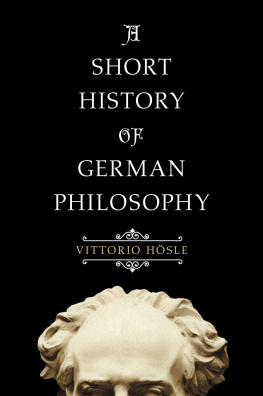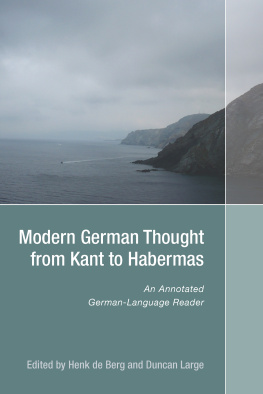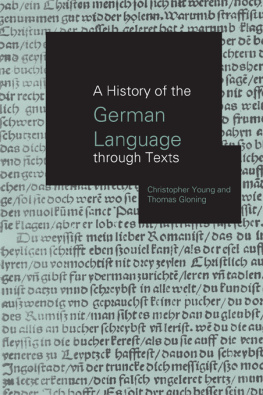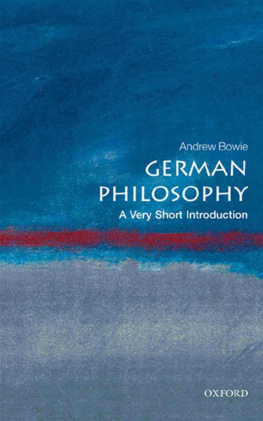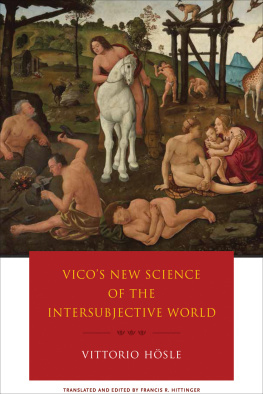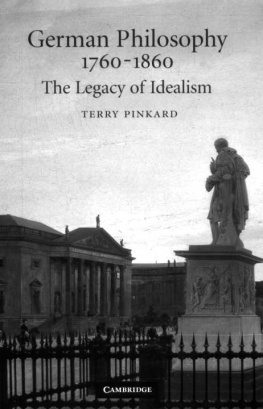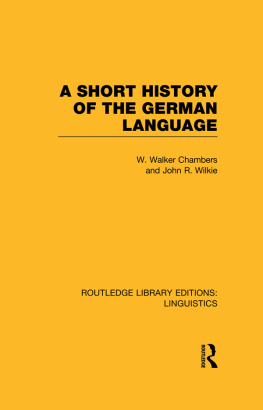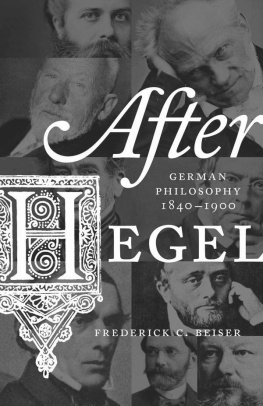A Short History
of German Philosophy

A Short History
of German Philosophy

Vittorio Hsle
TRANSLATED BY STEVEN RENDALL
Princeton University Press
Princeton & Oxford
Originally published as Eine kurze Geschichte der deutschen Philosophie by Vittorio Hsle
Verlag C.H.Beck oHG, Mnchen 2013
English translation 2017 by Princeton University Press
Preface to the English translation 2017
Published by Princeton University Press, 41 William Street, Princeton, New Jersey 08540
In the United Kingdom: Princeton University Press, 6 Oxford Street, Woodstock, Oxfordshire OX20 1TW
press.princeton.edu
This publication has been generously supported by the Institute for Scholarship in the Liberal Arts at the University of Notre Dame.
Jacket art courtesy of Lebrecht Music and Arts Photo Library/Alamy
All Rights Reserved
Library of Congress Cataloging-in-Publication Data
Names: Hsle, Vittorio, 1960- author. | Rendall, Steven, translator.
Title: A short history of German philosophy / Vittorio Hosle ; Translated by
Steven Rendall.
Other titles: Kurze Geschichte der deutschen Philosophie. English
Description: Princeton : Princeton University Press, 2016. | Originally
published as Eine kurze Geschichte der deutschen Philosophie by Vittorio
Hosle (c) Verlag C.H.Beck oHG, Munchen 2013. | Includes index.
Identifiers: LCCN 2016007315 | ISBN 9781400883042 (cloth)
Subjects: LCSH: Philosophy, GermanHistory.
Classification: LCC B2521 .H67 2016 | DDC 193--dc23 LC record available at http://lccn.loc.gov/2016007315
British Library Cataloging-in-Publication Data is available
This book has been composed in Garamond Premier Pro and Aldus LT Std
Printed on acid-free paper.
Printed in the United States of America
10 9 8 7 6 5 4 3 2 1
IN GRATEFUL MEMORY OF MY MOTHER,
CARLA GRONDA HSLE (19292015), WHO FOR
HER HUSBAND AND HER CHILDRENS SAKE
LIVED FAR AWAY FROM HER BELOVED ITALY
TRANSLATORS NOTE
Translations of texts quoted in this book have been taken from the following:
Walter Benjamin, Illuminations, trans. Harry Zohn. New York: Schocken, 1969.
Martin Buber, I and Thou, trans. Ronald Gregor Smith. New York: Scribners, 1958, 1986.
Ludwig Feuerbach, Essence of Christianity, trans. Marian [sic] Evans. 2nd ed., London, 1890.
Johann Gottlieb Fichte, System of Transcendental Idealism, trans. Peter L. Heath. University of Virginia Press, 1993.
, The Way towards the Blessed Life, trans. W. Smith, 1849.
Gottlob Frege, Concept Script: A Formal Language of Pure Thought Modelled on That of Arithmetic, trans. S. Bauer-Mengelberg. In From Frege to Gdel: A Source Book in Mathematical Logic, 18791931. Harvard University Press, 1967.
Hans-Georg Gadamer, The Anticipation of Completeness. In Georgia Warnke, The Hermeneutics, Tradition, and Reason, Stanford University Press, 1987.
, Truth and Method, trans. Joel Weinsheimer and Donald G. Marshall. New York: Continuum, 2004.
Georg Wilhelm Friedrich Hegel, Elements of the Philosophy of Right, trans. T. M. Knox. Oxford University Press, 1967; trans. H. B. Nisbet. Cambridge University Press, 1991.
Martin Heidegger, The Question concerning Technology, trans. in Craig Hanks, ed., Technology and Values, Chichester UK: Wiley-Blackwell, 2010.
Karl Jaspers, Man in the Modern Age, trans. E. Paul and C. Paul. London: Routledge, 1933.
Immanuel Kant, Critique of Practical Reason, trans. Lewis White Beck. New York: Liberal Arts, 1956.
, Metaphysical Elements of Justice, trans. John Ladd. Indianapolis: Hackett, 1999.
, The Metaphysics of Morals, trans. Mary J. Gregor. Cambridge University Press, 1994.
Karl Marx, The German Ideology, trans. Salo Ryazanskaya. Moscow: Progress Publishers, 1968.
Friedrich Nietzsche, The Antichrist, trans. Judith Norman. Cambridge University Press, 2005.
, Beyond Good and Evil, trans. Judith Norman. Cambridge University Press, 2002.
, The Gay Science, trans. Josefine Nauckhoff. Cambridge University Press, 2001.
, Human, All Too Human, trans. R. J. Hollingdale. Cambridge University Press, 2nd ed. 1996.
, Untimely Meditations, trans. R. J. Hollingdale. Cambridge University Press, 2nd ed. 1997.
Friedrich Wilhelm Joseph Schelling, A History of Modern Philosophy, trans. A. Bowie. Cambridge University Press, 1994.
, Philosophical Investigations into the Essence of Human Freedom, trans. Jeff Love and Johannes Schmidt. Albany: SUNY Press, 2010.
Ludwig Wittgenstein, Philosophical Investigations, trans. G.E.M. Anscombe. New York: Macmillan, 1953.
, Tractatus Logico-Philosophicus, trans. D. F. Pears and Brian McGuinness. London: Routledge and Kegan Paul, 1966.
All other translations are by Steven Rendall.
PREFACE TO THE ENGLISH TRANSLATION
It is with pleasure and pride that I welcome the English translation of this short history of German philosophy, coming out of such a distinguished American university press only a few years after the original, which was published in 2013. (The only earlier translation is a Korean one, which appeared in 2015.) In Germany, the book has already had a remarkable impact, as the various reviews, both in newspapersphilosophy so markedly different from what the discipline has become, particularly in the United States.
1. The main questions asked by the reviewers have of course been: How is German philosophy defined? And: Is it a reasonable enterprise to write about it? Since the definition of a term is to a large degree arbitrary, it is the second question that has to be tackled first, for German philosophy has to be defined in such a way that narrating its history makes sense. But whatever definition is proposed, can it ever make sense? Is it not obvious that German philosophers were influenced by non-German thinkers, both from Antiquity and from the more recent past? And does not focusing on German thought alone discriminate against the two other major modern European philosophical traditions, the French and the British, to which one can add, even if its influence was on a somewhat lesser level, the Italian?
The answer can only be that of course German philosophy is not an isolated part of world philosophyno more than any other national philosophical tradition. It would be indeed far more satisfying to write a global history of philosophy, rendering due attention to all the connections that exist between the thinkers of the past. (Such connections are both causal and structuralfor certain patterns of thought recur in the history of philosophy, independently of causal connections.that there are not many people who could tackle such a project. The author of this book at least recognizes that it is beyond his forces. For most people, it is necessary and generally acknowledged as legitimate to focus on a segment of the history of philosophy, whether on a single author or on a single epoch, such as the philosophy of the seventeenth century.
But why focus on a single culture? Is this not anachronistic in an age of increasing globalization, andworsedoes it not surreptitiously support nationalistic thinking? I think the last chapter of this book will suffice to answer this charge.tions to gain access to Hume, but fortunately even in the era of national cultures the work of translators bridged the divides between the various cultures. Still, the influence of these two thinkers led only to a transformation, not a rejection of Kants early Leibnizianism; Kants mature system retained quite a few of the traits of his Leibnizianism, and these radically distinguish it from contemporary British empiricism.

